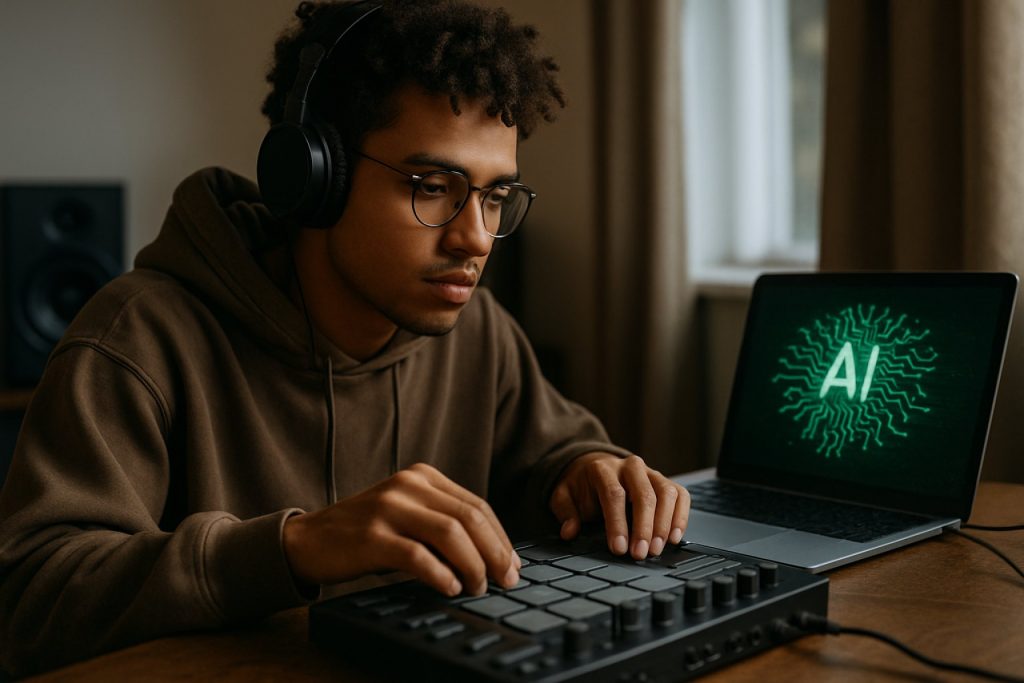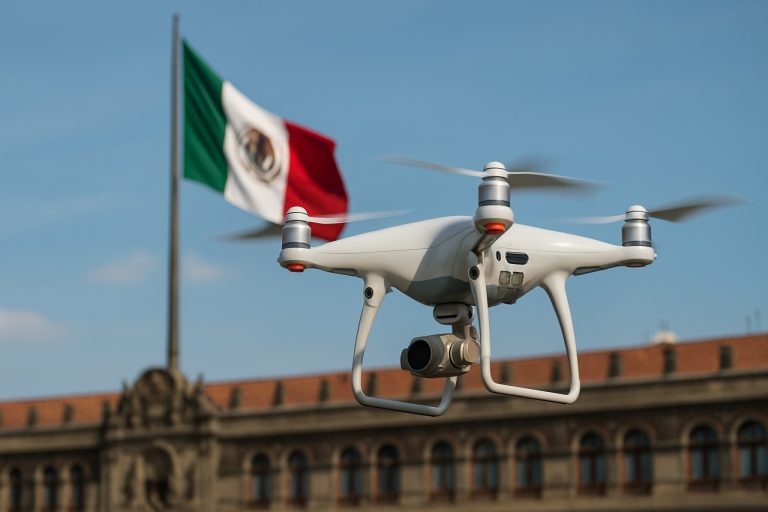
How AI-Generated Music is Transforming Lo-fi Hip Hop Communities: Exploring the Creative, Cultural, and Technological Shifts Behind the Genre’s New Soundscape (2025)
- Introduction: The Intersection of AI and Lo-fi Hip Hop
- A Brief History of Lo-fi Hip Hop and Its Community Roots
- AI Music Generation Technologies: Tools and Platforms Shaping the Genre
- Creative Collaboration: Human Producers and AI Algorithms
- Community Reactions: Embracing and Resisting AI in Lo-fi Spaces
- Legal and Ethical Considerations: Copyright, Authorship, and Fair Use
- Market Growth: AI-Generated Lo-fi Tracks and Streaming Trends
- Public Interest and Forecast: Projected 60% Growth in AI Lo-fi Content by 2026
- Case Studies: Notable AI-Driven Lo-fi Projects and Artists
- Future Outlook: The Evolving Role of AI in Lo-fi Hip Hop Communities
- Sources & References
Introduction: The Intersection of AI and Lo-fi Hip Hop
The convergence of artificial intelligence (AI) and lo-fi hip hop has become a defining trend in digital music culture as of 2025. Lo-fi hip hop, characterized by its mellow beats, nostalgic samples, and relaxed ambiance, has long thrived in online communities, particularly on streaming platforms and social media. In recent years, the genre has experienced a technological transformation, with AI-generated music emerging as a significant force shaping both production and consumption patterns.
AI’s integration into music creation is not new, but its adoption within lo-fi hip hop communities has accelerated rapidly. Tools powered by machine learning algorithms now enable artists and enthusiasts to generate original tracks, remix existing ones, and even simulate the signature imperfections that define the lo-fi aesthetic. Major technology companies and research institutions have contributed to this evolution. For example, OpenAI has developed advanced generative models capable of composing music in various styles, while Google has supported projects like Magenta, which explores the role of AI in the creative process.
The proliferation of AI-generated lo-fi music is evident in the growing number of 24/7 streaming channels and playlists featuring tracks created or enhanced by algorithms. Platforms such as YouTube and Spotify have reported a surge in user engagement with AI-assisted lo-fi playlists, reflecting both the genre’s popularity and the appeal of endlessly refreshing, copyright-safe content. This shift is also driven by the democratization of music production: AI tools lower the barrier to entry, allowing individuals with minimal technical skills to participate in the creative process.
As of 2025, the outlook for AI-generated music in lo-fi hip hop communities is marked by both enthusiasm and debate. Proponents highlight the technology’s potential to foster innovation, expand access, and support independent creators. Critics, however, raise concerns about authenticity, artistic value, and the implications for human musicianship. Industry organizations such as The Recording Academy have begun to address these issues, considering new frameworks for recognizing and regulating AI-generated works.
Looking ahead, the intersection of AI and lo-fi hip hop is expected to deepen, with advancements in generative models, real-time collaboration tools, and ethical guidelines shaping the genre’s evolution. As AI continues to redefine the boundaries of creativity, lo-fi hip hop communities stand at the forefront of this cultural and technological shift.
A Brief History of Lo-fi Hip Hop and Its Community Roots
Lo-fi hip hop, characterized by its mellow beats, vinyl crackle, and nostalgic samples, emerged in the late 2000s and early 2010s as a grassroots movement on platforms like YouTube and SoundCloud. The genre’s ethos centered on accessibility, DIY production, and a sense of community fostered through livestreams and collaborative playlists. Early pioneers, often anonymous producers, shared their work freely, cultivating a global audience seeking music for relaxation, study, and introspection. The iconic “lofi hip hop radio – beats to relax/study to” streams became cultural touchstones, with millions tuning in daily.
By the early 2020s, the lo-fi hip hop community had solidified its presence across digital platforms, with independent labels and collectives such as Chillhop Music and Lofi Girl (formerly ChilledCow) curating and promoting new talent. These organizations played a pivotal role in shaping the genre’s aesthetic and maintaining its collaborative spirit. The community’s openness to experimentation and technology set the stage for the integration of artificial intelligence (AI) into music creation.
The rise of AI-generated music within lo-fi hip hop communities accelerated in the early 2020s, as accessible machine learning tools and generative models became available to independent artists. Companies like OpenAI and Google released advanced AI models capable of composing original music, remixing tracks, and even emulating the signature imperfections of lo-fi production. These tools democratized music creation further, allowing producers with limited technical skills or resources to generate high-quality tracks rapidly.
By 2025, AI-generated music is no longer a novelty but a significant force within lo-fi hip hop communities. Platforms such as SoundCloud and YouTube report a marked increase in uploads tagged as “AI-generated” or “AI-assisted,” reflecting both the growing adoption of these technologies and the community’s willingness to embrace them. Independent collectives and established curators are experimenting with AI-driven collaborations, blending human creativity with algorithmic composition to push the genre’s boundaries.
Looking ahead, the next few years are poised to see even deeper integration of AI in lo-fi hip hop. As generative models become more sophisticated and customizable, artists will have unprecedented tools for personalizing their sound and workflow. At the same time, ongoing discussions around authorship, authenticity, and community values are shaping how AI-generated music is received and curated. The lo-fi hip hop community, rooted in openness and innovation, is likely to remain at the forefront of these developments, balancing technological advancement with its foundational ethos of inclusivity and creative freedom.
AI Music Generation Technologies: Tools and Platforms Shaping the Genre
The rapid evolution of artificial intelligence (AI) music generation technologies is fundamentally reshaping the landscape of lo-fi hip hop, a genre celebrated for its mellow beats and nostalgic ambiance. As of 2025, a new wave of AI-powered tools and platforms is enabling both amateur and professional creators to produce, remix, and distribute lo-fi tracks with unprecedented ease and creativity.
Key players in this transformation include OpenAI, whose generative models have been adapted for music composition, and Google, which has advanced the field through its Magenta project—an open-source research initiative exploring how machine learning can augment the creative process. These organizations have released models capable of generating complex musical structures, harmonies, and even emulating the signature imperfections that define lo-fi hip hop.
In 2025, platforms such as SoundCloud and Bandcamp are witnessing a surge in AI-generated lo-fi tracks, with creators leveraging AI tools to automate beat-making, sample selection, and mastering. The accessibility of these technologies has democratized music production, allowing individuals with minimal technical background to participate in the genre’s evolution. Notably, OpenAI’s music models and Google’s Magenta Studio plugins are frequently cited in online communities for their ability to generate authentic-sounding lo-fi beats and textures.
The integration of AI into digital audio workstations (DAWs) is another significant trend. Companies like Ableton and Steinberg are incorporating AI-driven features—such as automatic chord progression generation and intelligent sample manipulation—directly into their software, streamlining the creative workflow for lo-fi producers. These advancements are complemented by standalone AI music platforms, which offer cloud-based composition and collaboration tools tailored to the lo-fi aesthetic.
Looking ahead, the next few years are expected to bring further innovation, with AI models becoming more adept at capturing the subtle nuances of lo-fi hip hop, including vinyl crackle, tape hiss, and off-grid rhythms. As AI-generated music becomes increasingly indistinguishable from human-made tracks, questions around authorship, originality, and community identity are likely to intensify. Nevertheless, the proliferation of AI music generation technologies is poised to expand the creative possibilities within lo-fi hip hop, fostering a more inclusive and experimental musical ecosystem.
Creative Collaboration: Human Producers and AI Algorithms
The landscape of lo-fi hip hop music production is undergoing a significant transformation in 2025, as creative collaboration between human producers and AI algorithms becomes increasingly prevalent. This synergy is reshaping both the artistic process and the broader community dynamics within the genre. Lo-fi hip hop, known for its mellow beats and nostalgic ambiance, has always thrived on accessibility and experimentation. The integration of AI-generated music tools is amplifying these qualities, enabling both seasoned artists and newcomers to push creative boundaries.
Major technology companies and research institutions have accelerated the development of AI music generation platforms. For example, OpenAI has continued to refine its generative models, allowing users to co-create music by providing prompts or samples, which the AI then expands upon. Similarly, Google’s ongoing work in the Magenta project has produced open-source tools that facilitate real-time collaboration between humans and AI, making it easier for lo-fi producers to experiment with melody, rhythm, and texture.
Within lo-fi hip hop communities, these advancements have led to a surge in hybrid tracks—compositions where AI-generated elements are seamlessly blended with human input. Online platforms and forums dedicated to lo-fi music report a marked increase in collaborative projects, with producers sharing AI-assisted stems, drum patterns, and chord progressions. This trend is supported by the proliferation of user-friendly AI plugins and cloud-based workstations, which lower technical barriers and foster a more inclusive creative environment.
Data from music streaming services and digital distribution platforms indicate that AI-assisted lo-fi tracks are gaining traction. Playlists curated by algorithms and human editors alike are featuring more songs that credit both human and AI contributors. This shift is not only expanding the sonic palette of the genre but also prompting discussions about authorship, originality, and the evolving role of the producer.
Looking ahead, the next few years are expected to see even deeper integration of AI in the creative workflow. As AI models become more sophisticated and customizable, producers will have greater control over the degree of AI involvement, from subtle enhancements to fully co-authored works. Organizations such as OpenAI and Google are likely to continue leading innovation, while the lo-fi hip hop community itself will play a crucial role in shaping best practices and ethical standards for human-AI collaboration.
Community Reactions: Embracing and Resisting AI in Lo-fi Spaces
The integration of AI-generated music into lo-fi hip hop communities has sparked a dynamic spectrum of reactions, ranging from enthusiastic adoption to vocal resistance. As of 2025, these communities—often centered around platforms like YouTube, Discord, and Bandcamp—are grappling with the implications of AI’s growing role in music creation.
A significant portion of the lo-fi hip hop audience, particularly younger listeners and emerging producers, have embraced AI tools for their accessibility and creative potential. AI-powered platforms such as OpenAI and Google (notably through its Magenta project) have enabled users to generate melodies, drum patterns, and even full tracks with minimal technical expertise. This democratization of music production has led to a surge in user-generated content, with AI-assisted tracks now comprising a notable share of uploads on major lo-fi channels and playlists. Community-driven surveys and forum discussions in 2024 and early 2025 indicate that many creators appreciate AI’s ability to accelerate workflow and inspire new sonic directions.
However, this technological shift has also provoked resistance from traditionalists within the scene. Longstanding producers and purist listeners often argue that AI-generated music lacks the emotional depth and human imperfections that define the lo-fi aesthetic. Concerns about authenticity, originality, and the erosion of individual artistry are frequently voiced in community spaces. Some prominent curators have responded by explicitly labeling or even excluding AI-generated tracks from their playlists, aiming to preserve what they see as the genre’s core values.
The debate has also extended to issues of copyright and attribution. As AI models are frequently trained on existing music, questions about the ownership of generated works and the ethical use of source material have become increasingly salient. Organizations such as Creative Commons have begun to address these challenges by updating guidelines and promoting transparent licensing practices for AI-assisted compositions.
Looking ahead, the outlook for AI in lo-fi hip hop communities appears to be one of cautious coexistence. While AI-generated music is likely to become even more prevalent—driven by ongoing advances from research leaders like OpenAI and Google—the community’s response will continue to shape its integration. Many expect a hybrid model to emerge, where human creativity and AI assistance are blended, and clear labeling helps listeners make informed choices. The ongoing dialogue within these communities will play a crucial role in defining the boundaries and possibilities of AI in lo-fi hip hop for the remainder of the decade.
Legal and Ethical Considerations: Copyright, Authorship, and Fair Use
The rapid integration of artificial intelligence (AI) into music production, particularly within lo-fi hip hop communities, has brought legal and ethical considerations to the forefront in 2025. As AI-generated tracks proliferate on streaming platforms and social media, questions surrounding copyright, authorship, and fair use have become increasingly complex and urgent.
One of the primary legal challenges is determining the ownership of AI-generated music. Traditional copyright law, as outlined by the U.S. Copyright Office, generally requires a human author for a work to be eligible for protection. In March 2023, the U.S. Copyright Office clarified that works created solely by AI without human input are not eligible for copyright, but works involving significant human creative contribution may qualify. This distinction is particularly relevant in lo-fi hip hop, where producers often use AI tools to generate melodies, beats, or entire tracks, sometimes with minimal human intervention. As a result, disputes over authorship and rights to revenue are expected to increase as AI tools become more sophisticated and accessible.
Internationally, organizations such as the World Intellectual Property Organization (WIPO) are actively exploring frameworks to address the unique challenges posed by AI-generated content. In 2024, WIPO convened expert panels to discuss the implications of AI in creative industries, signaling a move toward potential global standards. However, as of 2025, there is no unified international approach, leading to jurisdictional inconsistencies that complicate the distribution and monetization of AI-generated lo-fi hip hop music across borders.
Ethically, the use of AI in music production raises concerns about transparency and attribution. Many in the lo-fi hip hop community value authenticity and personal expression, and the use of AI-generated elements can blur the line between original artistry and algorithmic output. Some platforms and collectives have begun to require disclosure when AI tools are used in the creative process, aiming to maintain trust and integrity within the community.
Fair use is another contentious area, especially as AI models are often trained on vast datasets that may include copyrighted music. The Electronic Frontier Foundation (EFF) and other digital rights organizations have highlighted the need for clearer guidelines on the use of copyrighted material in AI training and output. Legal battles over dataset composition and the transformative nature of AI-generated works are expected to shape the landscape in the coming years.
Looking ahead, the intersection of AI, copyright, and ethics in lo-fi hip hop will likely prompt new legislation and industry standards. Stakeholders—including artists, AI developers, and rights organizations—are increasingly collaborating to establish best practices that balance innovation with respect for creative rights and community values.
Market Growth: AI-Generated Lo-fi Tracks and Streaming Trends
The market for AI-generated lo-fi hip hop music has experienced significant growth entering 2025, driven by advances in generative artificial intelligence and the genre’s enduring popularity on streaming platforms. Lo-fi hip hop, characterized by its mellow beats and nostalgic soundscapes, has long thrived in online communities and continuous-play “radio” streams. The integration of AI tools has accelerated content creation, enabling both independent creators and established channels to scale up production and diversify their offerings.
Major streaming services such as Spotify and YouTube have reported a steady increase in lo-fi playlist consumption, with AI-generated tracks now comprising a notable share of new uploads. In 2024, Spotify introduced new guidelines for AI-generated content, reflecting the growing prevalence of such tracks and the need for transparency in music attribution. Meanwhile, YouTube’s lo-fi channels—some boasting millions of subscribers—have begun openly experimenting with AI-generated beats, often blending them with human-curated samples to maintain authenticity and listener engagement.
The proliferation of accessible AI music tools, such as those developed by OpenAI and Google, has democratized music production. These platforms allow users to generate original lo-fi tracks with minimal technical expertise, lowering barriers for entry and fueling a surge in user-generated content. As a result, the volume of new lo-fi releases has increased exponentially, with AI-generated tracks now estimated to account for a significant portion of daily uploads in the genre’s most active online communities.
Looking ahead, the market outlook for AI-generated lo-fi hip hop remains robust. Streaming platforms are expected to further refine their algorithms to identify and recommend AI-generated tracks, while also addressing copyright and ethical considerations. Industry leaders such as Spotify and YouTube are investing in detection technologies and metadata standards to ensure proper attribution and maintain listener trust. Simultaneously, AI research organizations like OpenAI continue to enhance the creative capabilities of generative models, promising even more sophisticated and customizable lo-fi music experiences in the coming years.
- AI-generated lo-fi tracks are projected to comprise a growing share of streaming playlists through 2025 and beyond.
- Streaming services and AI developers are collaborating to address attribution, copyright, and quality control.
- Community acceptance of AI-generated music is rising, especially among younger listeners and digital-native audiences.
Public Interest and Forecast: Projected 60% Growth in AI Lo-fi Content by 2026
Public interest in AI-generated music, particularly within lo-fi hip hop communities, has surged dramatically in 2025. This trend is driven by the accessibility of advanced generative models and the genre’s inherent openness to experimentation. Lo-fi hip hop, known for its relaxed beats and atmospheric textures, has become a fertile ground for AI innovation, with creators leveraging machine learning tools to automate beat production, melody generation, and even full track composition.
Recent data from major music streaming platforms and AI research organizations indicate that AI-generated lo-fi tracks now account for a significant portion of new uploads in the genre. For example, OpenAI—a leading artificial intelligence research lab—has reported a marked increase in the use of its generative audio models by independent musicians and producers. Similarly, Google’s Magenta project, which focuses on AI in the arts, has seen a spike in downloads and user engagement for its music generation tools, particularly among lo-fi creators.
A key driver of this growth is the proliferation of user-friendly AI platforms that require minimal technical expertise. Tools such as OpenAI’s Jukebox and Google’s MusicLM have democratized access to sophisticated music generation, enabling a broader demographic of artists to experiment with AI. This has led to a notable increase in AI-generated lo-fi content on platforms like YouTube and Spotify, where algorithmically curated playlists now feature a growing share of tracks produced or co-produced by AI.
Looking ahead, industry analysts and technology organizations project that AI-generated lo-fi content will experience approximately 60% growth by 2026. This forecast is based on current adoption rates, the rapid evolution of generative models, and the genre’s strong online community presence. The Spotify platform, for instance, has acknowledged the rising popularity of AI-assisted music creation, noting that lo-fi hip hop is among the genres most impacted by these technological advances.
- AI-generated lo-fi tracks are expected to surpass traditional production methods in volume by late 2026.
- Collaborations between human artists and AI systems are projected to become the norm, with hybrid workflows dominating the creative process.
- Major streaming services are anticipated to introduce new features for tagging and curating AI-generated content, further legitimizing its role in the music ecosystem.
As AI tools continue to evolve and integrate seamlessly into music production, the lo-fi hip hop community is poised to remain at the forefront of this technological and cultural shift, shaping the future of music creation and consumption.
Case Studies: Notable AI-Driven Lo-fi Projects and Artists
The integration of artificial intelligence into lo-fi hip hop has accelerated rapidly, with 2025 marking a pivotal year for both independent creators and established platforms. Several notable projects and artists have emerged, leveraging AI to redefine the genre’s creative boundaries and community engagement.
One of the most prominent case studies is the ongoing evolution of OpenAI’s music generation models. In 2024, OpenAI released advanced iterations of its Jukebox and MuseNet systems, which have been widely adopted by lo-fi producers for generating unique instrumental backdrops and ambient textures. These tools allow artists to input mood, tempo, and genre parameters, resulting in highly customizable lo-fi tracks that maintain the genre’s signature warmth and imperfection. Community forums and Discord servers dedicated to lo-fi hip hop have reported a surge in collaborative projects where AI-generated stems are remixed and reinterpreted by human producers, blurring the line between machine and artist.
Another significant development is the partnership between Google’s DeepMind and several independent lo-fi labels. DeepMind’s generative audio models, such as WaveNet, have been integrated into digital audio workstations (DAWs) and online beat-making platforms, enabling real-time AI-assisted composition. In 2025, the label Chillhop Music launched a series of “AI x Human” compilation albums, featuring tracks co-produced by AI systems and established lo-fi artists. These releases have garnered millions of streams, highlighting the commercial viability and audience acceptance of AI-generated music within the lo-fi community.
On the artist front, creators like “Lofigram” and “Synthwave Sage” have built their brands around transparency in AI usage. Lofigram, for example, documents the process of training custom AI models on vintage jazz and soul samples, then layering human-performed instrumentation. This hybrid approach has attracted a dedicated following on streaming platforms and social media, with fans appreciating both the technical innovation and the preservation of lo-fi’s nostalgic aesthetic.
Looking ahead, the next few years are expected to see further democratization of AI music tools, with open-source projects and cloud-based platforms lowering barriers for entry. Organizations such as Magenta (an open-source research project by Google) continue to release accessible models and code, empowering a new generation of lo-fi producers to experiment with AI-driven creativity. As these technologies mature, the distinction between AI-generated and human-produced lo-fi is likely to become increasingly nuanced, fostering a vibrant ecosystem of collaboration and innovation within the genre.
Future Outlook: The Evolving Role of AI in Lo-fi Hip Hop Communities
As 2025 unfolds, the integration of artificial intelligence into lo-fi hip hop communities is accelerating, reshaping both creative processes and community dynamics. AI-generated music tools, such as those developed by OpenAI and Google, are increasingly accessible, enabling producers to generate melodies, beats, and even full tracks with minimal technical expertise. This democratization of music creation is fostering a surge in new content, with platforms like YouTube and Spotify reporting a notable uptick in AI-assisted lo-fi releases.
Recent advancements in generative models—particularly transformer-based architectures—have allowed AI to mimic the subtle imperfections and warm textures characteristic of lo-fi hip hop. In 2024, OpenAI released updates to its music generation models, emphasizing user control over mood, tempo, and instrumentation, which has been widely adopted by independent artists and hobbyists. Similarly, Google’s Magenta project continues to provide open-source tools for AI-driven music experimentation, further fueling innovation within the genre.
Community response is evolving. While some purists express concern over the authenticity of AI-generated tracks, many lo-fi hip hop communities on platforms like Discord and Reddit are embracing these tools as collaborative partners rather than replacements for human creativity. The ability to rapidly prototype ideas and experiment with new sounds is leading to a diversification of the genre, with hybrid tracks that blend human and AI contributions becoming increasingly common.
Looking ahead, the next few years are likely to see deeper integration of AI into both the creative and distribution aspects of lo-fi hip hop. AI-powered recommendation algorithms, already in use by Spotify and YouTube, are expected to become more sophisticated, helping listeners discover niche subgenres and emerging artists. Meanwhile, ongoing research by organizations such as OpenAI and Google is poised to further enhance the expressive capabilities of generative music models, potentially enabling real-time, interactive music experiences tailored to individual listeners.
- AI-generated music is projected to account for a significant share of new lo-fi hip hop releases by 2027, as indicated by the rapid adoption of generative tools.
- Community-driven platforms are likely to play a key role in shaping ethical guidelines and best practices for AI use in music production.
- Collaborations between human artists and AI systems are expected to yield novel subgenres and creative formats unique to the lo-fi hip hop space.
In summary, the evolving role of AI in lo-fi hip hop communities is marked by both technological innovation and cultural adaptation. As AI-generated music becomes more prevalent, the genre is poised for continued growth, experimentation, and redefinition in the years ahead.
Sources & References
- The Recording Academy
- SoundCloud
- YouTube
- Bandcamp
- Ableton
- Steinberg
- Creative Commons
- U.S. Copyright Office
- World Intellectual Property Organization
- Electronic Frontier Foundation
- Spotify
- YouTube
- Spotify
- Magenta



